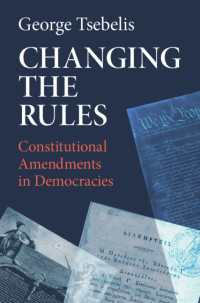- ホーム
- > 洋書
- > 英文書
- > Politics / International Relations
Full Description
We live in a world which is characterised by both a radical inequality in wealth and incomes and the accelerating depletion of scarce natural resources. One of the things that prevents us from addressing these problems, perhaps even prevents us from seeing them as problems, is our belief that individuals and corporations have claims to certain resources and income streams that are non-negotiable, even when these claims seem manifestly hostile to our collective long-term well-being. This book is an attempt to understand how, why and when we came to believe these things. This first volume traces ideas about private property and its justification in the Latin West, starting with the ancient Greeks. It follows several lines of thinking which run through the Roman and medieval worlds. It traces the profound impact of the rise of Christianity and the instantiation of both natural and Roman Law. It considers the complex interplay of religious and legal ideas as these developed through the Renaissance, the Reformation and the counter-Reformation leading on to the ideas associated with modern natural law. The first volume concludes with a close re-reading of Locke. We can find well-made arguments for private property throughout this history but these were not always the arguments which we now assume them to have been and they were almost always radically conditional, qualified by other considerations, above all, a sense of what the securing of the common good required. These arguments included an appeal to the natural law, to the dispensations of a just God, to utility, to securing economic growth and to maintaining the peace. They almost never included the claim that individuals have naturally- or God-given rights that trump the well-being, especially the basic well-being, of other individuals. In late modernity, we have lost sight of many of these arguments - to our collective loss.
Contents
Introduction ; 1. The Greeks: property and the common good ; 2. The Romans: private property and personhood ; 3. The Early Christian Church: property and sinfulness ; 4. The Medieval World: Roman laws, natural laws, and God's law ; 5. The Late Medieval World: princes, popes and supreme poverty ; 6. The Early Sixteenth Century: renaissance and reformation ; 7. The Later Sixteenth Century: absolutism and resistance ; 8. Natural Law and Natural Right in the Seventeenth Century: Grotius, Hobbes, and Pufendorf ; 9. Seventeenth-Century Radicals: republicans, levellers and diggers ; 10. Locke ; Conclusion
-

- 洋書電子書籍
-
民主国家における憲法修正
Cha…
-

- 電子書籍
- 魔王伝(3)魔性編 祥伝社文庫





